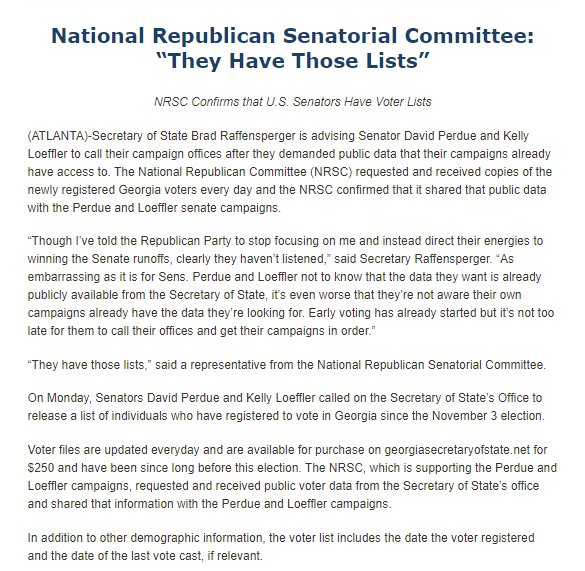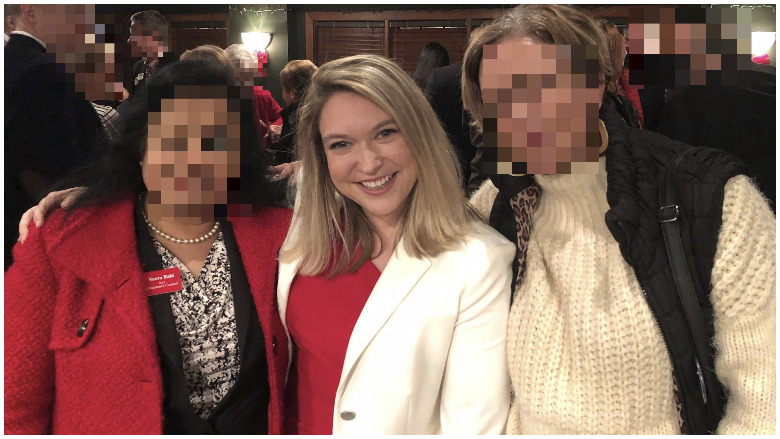
Facebook Jordan Fuchs
Jordan Fuchs, Georgia’s deputy secretary of state, was outed by the Washington Post as the newspaper’s source of false quotes attributed to former President Donald Trump.
The source of the story – in which Trump was falsely quoted as telling a Georgia election investigator, Frances Watson, to “find the fraud” to become a “national hero” – was initially kept anonymous in its January 2021 story. However, when the Wall Street Journal obtained audio of the call that showed Trump had not used those exact words, the newspaper ran a lengthy correction and revealed Fuchs had been its source.
Heavy has reached out to Fuchs seeking comment. On March 16, she provided this statement,
The Secretary of State’s Office’s first reported about its investigator’s phone conversation with President Trump relied on the investigator’s recollection. Information about the content of the call was never presented as a word-for-word transcript. After hearing the tape, it’s clear that the investigator’s recollection accurately portrayed the president’s assertions that there was fraud to uncover and that she would receive praise for doing so.
Fuchs received the information secondhand from Watson, the Post revealed. “The Washington Post reported on the substance of Trump’s Dec. 23 call in January, describing him saying that Watson should ‘find the fraud’ and that she would be a ‘national hero,’ based on an account from Jordan Fuchs, the deputy secretary of state, whom Watson briefed on his comments,” the Post wrote in a story on the Wall Street Journal’s audio scoop.
The story had come right before the Georgia senate runoff elections that Republicans ended up losing and while Trump was verbally attacking Georgia’s Republican secretary of state, Fuchs’ boss. “Though I’ve told the Republican Party to stop focusing on me and instead direct their energies to winning the Senate runoffs, clearly they haven’t listened,” Secretary of State Brad Raffensperger said in a release around that time. Georgia prosecutors are reviewing Trump’s behavior for potential criminal wrongdoing and whether he illegally pressured elections’ officials to change the results of the election.
Who is Jordan Fuchs?
Here’s what you need to know:
1. The Post Story Came During Rising Tensions Between Trump & Fuchs’ Republican Boss in Georgia
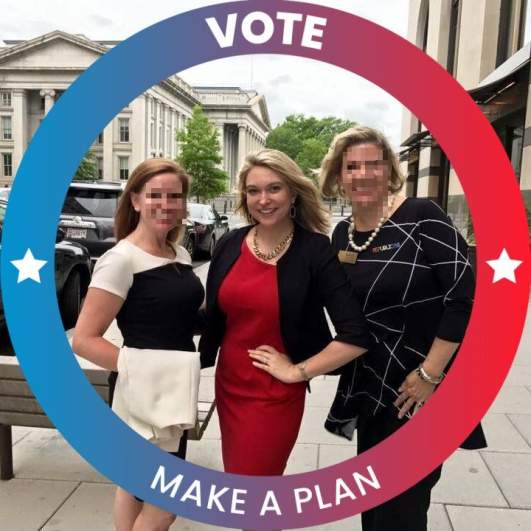
FacebooJordan Fuchs
The original story, by Amy Gardner, ran on January 9. “President Trump urged Georgia’s lead elections investigator to ‘find the fraud’ in a lengthy December phone call, saying the official would be a ‘national hero,’ according to an individual familiar with the call who spoke on the condition of anonymity because of the sensitivity of the conversation,” the story said before the correction.
The Post’s story says the president’s call could amount to criminality, saying that Trump “placed the call to the investigations chief for the Georgia secretary of state’s office shortly before Christmas — while the individual was leading an inquiry into allegations of ballot fraud in Cobb County, in the suburbs of Atlanta, according to people familiar with the episode.”
In its correction, the Post wrote,
“Two months after publication of this story, the Georgia secretary of state released an audio recording of President Donald Trump’s December phone call with the state’s top elections investigator. The recording revealed that The Post misquoted Trump’s comments on the call, based on information provided by a source.”
The newspaper added,
Trump did not tell the investigator to ‘find the fraud’ or say she would be ‘a national hero’ if she did so. Instead, Trump urged the investigator to scrutinize ballots in Fulton County, Ga., asserting she would find ‘dishonesty’ there. He also told her that she had ‘the most important job in the country right now.’
The claims ricocheted through other media, which also reported them after the Post did.
The Wall Street Journal broke the story of the second call after obtaining the audio.
The Journal article quotes Trump as saying, “When the right answer comes out, you’ll be praised,” and Watson responding: “I can assure you that our team and the [Georgia Bureau of Investigation], that we are only interested in the truth and finding the information that is based on the facts.”
The Post, in a story on the new audio, quoted Trump as saying, “The people of Georgia are so angry at what happened to me. They know I won, won by hundreds of thousands of votes. It wasn’t close.” He also said, “Whatever you can do, Frances, it would be — it’s a great thing. It’s an important thing for the country. So important. You’ve no idea. So important. And I very much appreciate it.”
The newspaper reported that they were originally told no audio of the call existed. “Officials located the recording on a trash folder on Watson’s device while responding to a public records request,” the Post reported.
Watson told WSB-TV that “she did not perceive any pressure from the president’s call and the phone call has not been requested from any investigative agency.”
According to the Post, the article came around the same time the same journalist broke a story about a separate call between Trump and Georgia Secretary of State Brad Raffensperger, in which the president pressured Raffensperger to “find” votes to “overturn his defeat.” That call occurred after the call to Watson.
“That was an ongoing investigation,” Raffensperger told The Post about the first call. “I don’t believe that an elected official should be involved in that process.”
The Associated Press also ran a correction but hasn’t identified its original source. It reads,
This story was first published on Jan. 9, 2021. It was updated on March 15, 2021, to correct that The Associated Press, based on information provided by a source, erroneously reported that Trump pressed the investigator to ‘find the fraud’ and said it would make the investigator a national hero. A recording of the call made public two months later revealed that Trump did not say either and instead said that if the investigator looked into Fulton County the investigator would ‘find things that are gonna be unbelievable.’ Trump also told the investigator: ‘When the right answer comes out, you’ll be praised.'”
2. Fuchs Previously Went After a Controversial Attorney, Calling Out His ‘Little Man Ego’ When He Raised Questions About Her Age & Experience
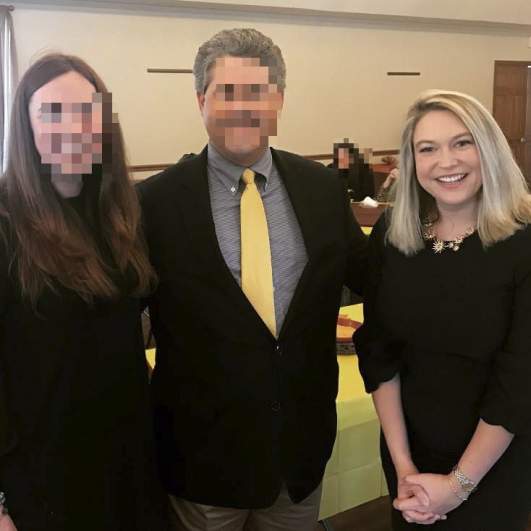
FacebookJordy Fuchs
Earlier, as Trump was raising claims of unproven voter fraud, Fuchs slammed controversial attorney L. Lin Wood, who raised questions on Twitter about her age and experience.
“Little man ego will always have issues with female leadership. Just ask @LLinWood former law partners… and ex wife,” she wrote on Twitter on December 16. In another tweet, she wrote, “Have you ever met a man with a tiny man ego? How do you manage little man syndrome? Asking for a friend.”
Wood responded, “By the way, Jordy, I don’t think your private relationships with members of the opposite sex is relevant to Dominion voting machine deals. Do you? #FightBack Hard When Over The Target.” Fuchs also goes by the name Jordy Fuchs.
Wood retorted, “‘Little man ego?’ ‘Issues with female leadership?’ ‘Former law partners?’ ‘Ex-wife.’ I have shrunk 2 1/2 inches in height as I have aged. Now 5’10”. I did agree to pay a former female partner in her 30’s $9M in fees for her excellent work on one of my cases.”
That tweet came in response to Wood’s earlier tweet in which he wrote, “Do you believe @JordyFuchs age 30 with 1 year of government experience should have negotiated Dominion deal & thereafter essentially run GA Sec. of State Office? She was previously political consultant & was appointed as Deputy by @GaSecofState. Something ain’t right in GA.” Wood even claimed on twitter that “Jordan Fuchs @JordyFuchs has admitted publicly on Facebook that she was at one time a practicing witch. Yes, a Wicken. I do not respect that belief.”
Wood is the former attorney for Richard Jewell who raised unverified claims of voter fraud as the runoff elections loomed. Republicans eventually lost those seats.
3. Fuchs Previously Told the Washington Post That Republicans Expected Georgia’s Top GOP Officials ‘to Cheat for Them’
Fuchs has also been vocally critical of voter fraud claims pushed by Trump to no avail in Georgia.
“Republicans fell into a trap by expecting Brad Raffensperger and Brian Kemp to cheat for them,” she told The Washington Post.
Fuchs called out Trump after election officials from both parties received death threats, telling Reuters, “Trump and U.S. senators have refused to condemn these death threats,” she told Reuters. “In fact, he continues to support those who are actively calling for elections officials to be shot.”
In 2019, King5.com reported that Raffensperger had announced that the state “plans to buy a $106 million election system from Denver-based Dominion Voting Systems. He certified the new system on Aug. 9” 2019. The article says a petition carrying more than 1,400 signatures was submitted raising questions about the Dominion machines.
Voters are allowed to request that the Secretary of State “reexamine any such device previously examined and approved by him or her” if they get enough signatures, the station reported. The Associated Press reported that the office planned to reexamine the machines.
“Requesting a reexamination of the new paper ballot system almost immediately after it was thoroughly tested and passed by an independent testing lab is a waste of everyone’s time and resources,” Deputy Secretary of State Jordan Fuchs said to the television station in response.
“We will comply with the legal requirements to conduct a reexamination, but the activists requesting the reexamination will have to pay for it,” Fuchs said.
4. Fuchs Previously Ran the Secretary of State’s Campaigns in Georia
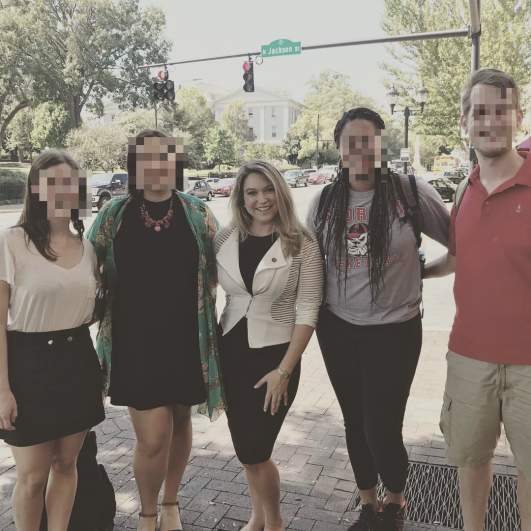
FacebookJordan Fuchs
Fuchs’ professional relationship with Raffensperger goes way back.
A press release announcing that Georgia Secretary of State-elect Brad Raffensperger was appointing Jordan Fuchs as Deputy Secretary of State called that position “one of the most important non-elected positions in Georgia since the Secretary of State’s office is responsible for elections, corporation registrations, business and occupational licensing and securities.”
“Tricia and I have worked with Jordan closely for years,” said Raffensperger, a Republican. “She is fully dedicated to achieving the goals outlined during the campaign, and given the tasks we have ahead of us there is no one else I would rather have leading our office.”
The release says Fuchs “managed Raffensperger’s campaigns for both State Legislature and for Secretary of State.”
According to the release, prior to her service with Raffensperger, Jordan Fuchs “served as Vice President of Landmark Communications, a leading political consulting and public relations firm based in Alpharetta.” On Twitter, where she has posted numerous stories debunking voter fraud claims, she called it a Republican firm.
She has experience in Washington D.C. “Prior to joining Landmark Communications, Fuchs worked in Washington, D.C. in the Congress and U.S. Foreign Policy Program with the Council on Foreign Relations and on Capitol Hill in the office of U.S. Representative Rob Woodall,” says the release.
“I have watched Jordan thrive in the high pressure and highly visible role leading a large organization,” continued Raffensperger. “I have the utmost confidence that she can successfully direct the efforts of this office, and achieve the goals upon which I campaigned. I am confident she will work hard for the people of Georgia.”
Her LinkedIn page explains of the Landmark experience, “Jordan Fuchs is the former Vice President and Political Consultant at Landmark Communications, Inc. Focused on competitive primary and general elections across Georgia, Jordan led the modernization of Landmark Communications’ local campaign tactics in advertising, public relations research, IVR and digital polling, digital media, canvassing and outreach. She served as a senior political consultant for federal, statewide, local and judicial candidates.”
5. Fuchs Has Degrees in Public Relations & Political Science
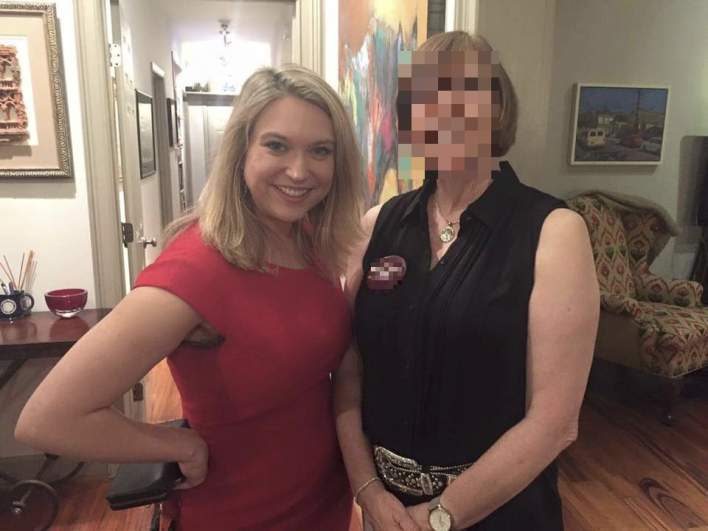
FacebookJordan Fuchs
According to the release, Fuchs “earned a B.A.J. in Public Relations from the Henry Grady School of Journalism and a B.A. in Political Science from the University of Georgia.”
“I am thankful and excited for the opportunity to serve the people of Georgia,” Fuchs said in the press release announcing her appointment. “We have many challenges ahead and we are building a team that can meet those challenges head-on. I believe that all Georgians will be proud of the team that will help us continue to be the best state in the nation in which to do business, raise a family, and build communities of which we can all be proud.”
She became deputy secretary of state in January 2019. Her LinkedIn page says she was a member of the College Republicans and Open Hand in college.
Fuchs was quoted in a Politico story in 2019 that reported a variety of groups were concerned that “Raffensperger and his staff are pushing ahead with a $150 million plan to switch the state to new voting machines (Dominion Voting Systems) that an array of experts warn would be susceptible to hacking.” That story says that Fuchs “scolded the tea party-aligned group FreedomWorks, which also opposes the machines,” by telling them, among other things, that they did not “fully comprehend the climate of our state, the demands of our communities, or the objectives of this office.”
READ NEXT: Wife Shoots D.C. Police Detective Husband After Sharing Wedding Video, Police Say
